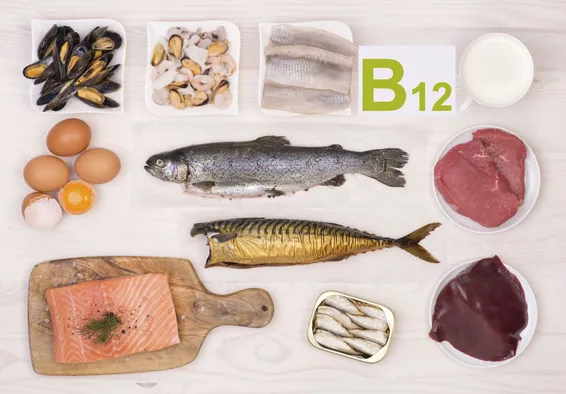What foods are high in Vitamin B12?


Welcome to another edition of MedChunk’s Health Bulletin where we strive to make health topics easy to understand. In today’s edition, we’ll take a look at some of the foods that are high in Vitamin B12.
Vitamin B12 is an essential vitamin mainly found in animal products. Vitamins and minerals are micronutrients required by the body to carry out a range of normal functions.
However, Vitamin B12 is not produced in our bodies and must be derived from the food we eat. Vitamins are organic substances that are generally classified as either fat-soluble or water-soluble.


Fat-soluble vitamins (vitamin A, vitamin E, vitamin D, and vitamin K) dissolve in fat and tend to accumulate in the body. Water-soluble vitamins (vitamin C and the B-complex vitamins, such as vitamin B6, vitamin B12, and folate) must dissolve in water before they can be absorbed by the body, and therefore cannot be stored. Excess water-soluble vitamins are thought to be eliminated in the urine.
Good dietary sources of vitamin B12 include:
- Poultry
Among animal-based foods, chicken is a good source of vitamin B12. Chicken meat with the skin contains 0.31 micrograms of vitamin B-12 per 100 grams, or 5 percent of the DV, and 0.21 micrograms per 4-ounce serving, or 4 percent of the DV.
Both milk and eggs are better sources of vitamin B-12 whether you measure by weight or by recommended serving size. However, chicken provides other nutrients as well as vitamin B-12, including protein, phosphorus, niacin and vitamin B-6, so it is still a nutritious option, and consuming it will help you meet your recommended intake for the day.
- Fish and fish oil capsules
A tuna is a saltwater fish that belongs to the tribe Thunnini, a subgrouping of the Scombridae family. Tuna is a commonly consumed fish and a great source of nutrients, including protein, vitamins, and minerals. It contains high concentrations of vitamin B12, especially in the muscles right beneath the skin.
Mercury content in tuna can vary widely. Among those calling for improved warnings about mercury in tuna is the American Medical Association, which adopted a policy that physicians should help make their patients more aware of the potential risks.
A 3.5-ounce (100-gram) serving of cooked tuna contains 453% of the DV for the vitamin. This same serving size also packs a good amount of lean protein, phosphorus, selenium, and vitamins A and B3. Canned tuna also contains a decent amount of vitamin B12. In fact, a can of light tuna canned in water contains 152% of the DV.
- Eggs
Each large whole egg contains 0.4 micrograms of vitamin B-12. This represents approximately 18 percent of the 2.4 micrograms of B-12 you need daily. While eggs are a significant source of vitamin B12, participants in one study only absorbed 9% of the vitamin B12 in eggs compared to 40% to 90% from other animal-based sources. However, the study also found that eating eggs regularly contributed a significant amount of vitamin B12 to participants’ diets.
- Dairy products
Dairy products retain, in general, a major part of the vitamin B12 naturally present in milk. Milk and other dairy products, such as yogurt and cheese, are great sources of protein and several vitamins and minerals, including vitamin B12. 1 cup of whole milk supplies 46% of the DV for vitamin B12.
While cheese is a good source of B12, protein, calcium, and vitamin D, you should limit your intake to 40 grams. Cheese is also a rich source of vitamin B12. Interestingly, studies have found that your body absorbs the vitamin B12 in milk and dairy products better than the vitamin B12 in fish or eggs.
- Yeast
Nutritional yeast is a unique vegetarian food with a pleasantly cheesy flavor and a powerful nutritional punch. But it does not naturally contain vitamin B12. However, it’s commonly fortified, which makes it a great source of this nutrient. Nutritional yeast is also a good vegan source of protein, vitamins, and minerals. As with fortified cereals, the vitamin B12 in nutritional yeast is vegan-friendly because it’s synthetic. Two tablespoons of nutritional yeast may contain up to 733% of the DV for vitamin B12
- Salmon
Salmon is the common name for several species of ray-finned fish in the family Salmonidae. Salmon is well known for having one of the highest concentrations of omega-3 fatty acids. It’s also an excellent source of B vitamins.
A half fillet of cooked salmon can pack 208% of the DV for vitamin B12. The same serving may also provide 4,123 mg of omega-3 fatty acids. Alongside its high-fat content, this fish offers a high amount of protein, with about 40 grams in a half fillet. Norway is the world’s largest producer of salmon, followed by Chile.
I hope you got a lot of information about the sources of Vitamin B12 from this article. I write articles on health every day. Please share this article with your friends.
Recent Posts
9 Ways to Reduce High Creatinine Levels
Creatinine is a natural byproduct formed when your muscles get down to business. As they…
What does protein do for muscles?
Have you ever wondered how muscles, those amazing things that help us move and do…
What factors contribute to elevated cortisol levels?
Let us spill the beans on a topic that might be causing you more yawns…
Why is keto diet effective in losing weight?
Let us talk about a popular topic that's been buzzing around lately: the keto diet.…
How to reduce blood sugar levels easily?
Living with high blood sugar levels can be challenging, but it's important to remember that…
What makes nuts challenging to digest?
I want to talk to you about something we all love to snack on but…